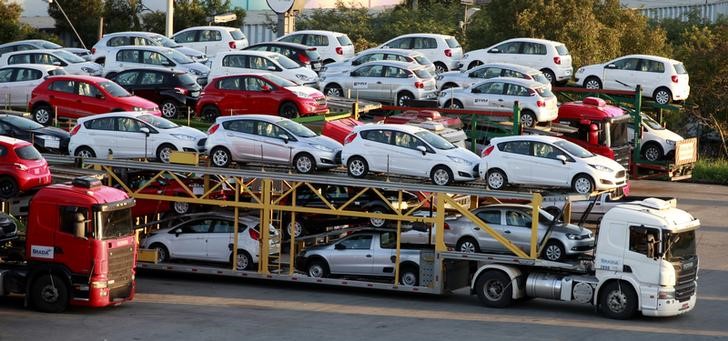(Changes dateline, byline, adds quotes from Mexican minister)
By Joanna Zuckerman Bernstein and Ana Isabel Martinez
MEXICO CITY/ATLANTA, Sept 29 (Reuters) - For auto parts
manufacturers in the Mexican state of Nuevo Leon, the fine print
of a Pacific trade deal negotiators aim to wrap up this week
could make or break an export industry boom built up over the
last 20 years that is now worth $60 billion.
Trade ministers from the 12 countries negotiating the
Trans-Pacific Partnership begin meeting in Atlanta on Wednesday
and are on the cusp of sealing the biggest trade deal in a
generation, cutting trade barriers and setting common standards
for 40 percent of the world economy.
The deal, a legacy-defining achievement for U.S. President
Barack Obama, hinges on overcoming deadlocks over trade in
dairy, drugs and autos - sticking points that represent the
sweet spot the deal must find between opening new markets,
shielding existing industries and drafting new rules for issues
ranging from intellectual property to labor rights.
The deal will have to protect a Mexican auto industry that
emerged as the North American Free Trade Agreement locked Mexico
and Canada into the supply chains for U.S. carmakers - and
increasingly their Japanese competitors, who manufacture there
to avoid U.S. import duties of 2.5 percent on Japan-made cars.
That tax will be phased out under the TPP, sparking fears in
Canada and Mexico that low local content thresholds for autos
will hand too great an advantage to rival supply chains in Asia.
Allowing cars with as little as 30 percent content from TPP
nations to escape import duties, as proposed by Japan, would
allow Japanese automakers to source parts in Asia and bypass
Mexico, industry sources said.
"(That) would be opening our market in a way that means
businesses here could not compete with Asian firms," said Manuel
Montoya, director general of the Automotive Cluster of Nuevo
Leon, an industry group that lists among its members companies
ranging from Daimler DAIGn.DE to smaller manufacturers of
batteries, lubricants and moulded plastic.
Mexico is vulnerable on high-volume, low-cost parts also
produced in low-wage countries such as Thailand, a key supplier
for Japanese auto makers, or China, which is building on its
current 13 percent share of the U.S. imported auto parts market,
compared with Mexico's 34 percent.
Oscar Albin, executive president of Mexico's National
Autoparts Industry (INA), said a 30 percent threshold would
reduce by more than a third exports to the United States that
enjoy a NAFTA standard roughly twice that high.
The hardest-hit sectors would be makers of automotive cable
harnesses, part of the electrical system, which account for $7
billion in exports, and car seat covers, he said.
A person briefed on the talks said he expected the final
threshold to be higher than 30 percent, though it would give
carmakers more flexibility to source outside the TPP bloc. "I
don't think they come away empty handed this time," he said.
A final accord, which has been six years in the making, will
need the blessing of the politically powerful auto industries in
the United States and Japan, the two biggest economies in the
bloc, and Canada, home to auto parts makers Martinrea
International MRE.TO and Linamar Corp LNR.TO .
"CAUTIOUSLY OPTIMISTIC"
Mexican Economy Minister Ildefonso Guajardo said talks on
autos were progressing and was hopeful of reaching a broad
agreement.
"I think we will arrive at a deal, but it will depend on two
or three issues," he told Reuters as he arrived in Atlanta.
Autos are one of a clutch of thorny issues ministers must
resolve to seal the deal and officials from TPP countries were
cautious of predicting success.
One senior Japanese government official said time was also
running out with the 2016 U.S. presidential race looming, which
will make it difficult for a Republican-led Congress to approve
any trade deal, let alone one pushed by Obama, a Democrat.
"If member nations cannot reach an agreement this time, it
could take years," he said.
U.S. Trade Representative Michael Froman said the United
States would not accept a weak TPP deal, regardless of time
pressures.
"I think it's possible it's not going to work, but I'm on
the 'cautiously optimistic' end of the spectrum," said Matthew
Goodman, a former Obama administration official now at
Washington's Center for Security and International Studies.
There are signs of movement on the other major sticking
points of dairy trade and rules preventing speedy knock-offs of
next-generation biologic drugs, made from living cells.
A source close to the talks said Ottawa rejected a push by
Washington for access equivalent to 10 percent of the domestic
dairy market.
On drugs, TPP countries are divided over a 12-year monopoly
sought by the United States and the five years in place in
countries such as Australia, for which even a compromise on
eight years would add millions to the cost of public health
schemes.
(Writing by Krista Hughes; Additional reporting by Kevin
Krolicki in Washington, David Ljunggren in Ottawa, Dave Graham
and Luis Rojas in Mexico City and Linda Sieg and Kaori Kaneko in
Tokyo; Editing by Alan Crosby and Ken Wills)
